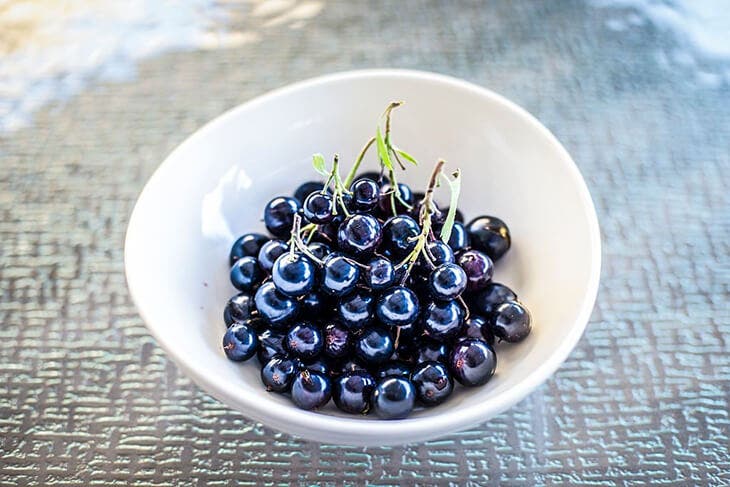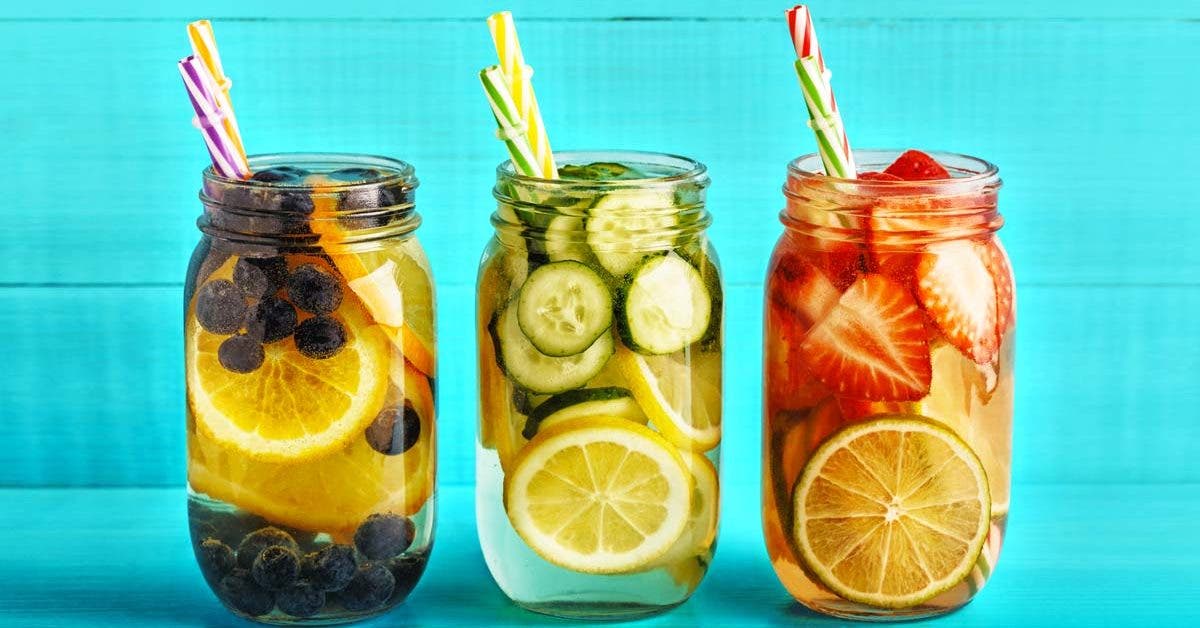The 11 Best Refreshing Drinks for Summer
What to drink in summer to hydrate while quenching your thirst with a pleasant, alcohol-free, sugar-free, calorie-free drink? Well plants, of course! If hot infusion is the only option that comes to mind, know that you can also prepare your herbal summer drinks in the form of hydrosols or macerations, which are much more refreshing! Caroline Gayet, herbalist and phytotherapist, gives you her 6 favorite recipes!
Summer is here with its barbecues, aperitifs on the terrace, its melon and its peaches, its sunbathing on the beach or on the balcony! But above all: it’s hot! The question of hydration is therefore crucial.
Water is the symbol of life. Without it, no organism can survive. Water dials near 37% of our body and serves as a vehicle for all cellular information. It hydrates all our tissues, cartilage, muscles, tendons, menisci, skin, brain, organs and viscera.
Good hydration allows us to avoid headaches, constipation and dry mucous membranes. It also allows the proper functioning of the biochemical reactions of our body as well as the drainage of our toxins and metabolic waste via the kidneys and the formation of urine.
In summer, the mechanisms of perspiration and perspiration (the “invisible” and permanent perspiration, which is done without apparent sweating) cause a much greater quantity of water to evaporate from our body than in winter, which must be compensated for by s hydrating more.
Light and bad drinkers
The concern is that some are light drinkers: by not drinking not enough, they concentrate their urine and expose themselves to an increased risk of urinary tract infection.
There are still those who don’t like water… and go s hydrate by drinking juices, smoothies, sodas, glasses of rosé or a nice cold beer. Of course, it is possible to drink it, but only in moderate frequency, because these drinks are far from being ideal for our health.
Finally, we have the problem of people elderly who, as they age, become “adypsic”, that is to say, they lose the feeling of thirst. They dehydrate more quickly, which can cause mental confusion, heat stroke and urinary tract infections.
There are then plants to make your own refreshing, healthy and delicious drinks. They give taste to water, stimulating hydration when it is lacking while providing always welcome therapeutic properties.
Nevertheless, I remind you that only water hydrates properly. Indeed, any herbal drink contains active ingredients that must be processed by the liver and eliminated by the kidneys, resulting in water loss. This is why it is said that all drinks, except water, are diuretic: they increase diuresis and make you lose more water than you bring in.
Consuming cold macerations of plants or hydrolats therefore does not dispense with drinking at least 22 cl to 1 L of water per day depending on your build, the weather, your intake, fruits and vegetables (as a reminder, fruits provide approximately 92% water and vegetables more than 60%), your physical activity and your health issues.
My top 6 cold macerations
Slices of ginger – Source: spm
Cold maceration simply consists of soaking aromatic plants in water in order to perfume. This may be what you are already doing with fresh mint leaves, organic lemon zest, slices of fresh ginger.
The advantage of maceration at cold compared to a hot water infusion, the extraction is more gentle. Very little tannin is extracted and the drink is much rounder in the mouth, less astringent than an infusion that you would have left to cool. Admittedly, we obtain fewer active ingredients… but the drink is much more thirst-quenching and tastes better!
Cold maceration lasts between fifteen minutes and overnight depending on the intensity the taste you want.
The 3 cold macerations with mint, lemon or ginger are timeless classics, but you can vary the pleasures by opting for other plants known for their thirst-quenching and refreshing action: hibiscus flowers, lemongrass and rosebuds.
Here are the virtues of all these summer plants:
- The mint
is digestive and its cold effect is undeniable, it is the refreshing plant par excellence, unbeatable!
- Lemonis digestive for the liver and soothes any type of nausea.
- Gingeris general tonic of the body and digestive.
- Lemongrass + lemon + ginger:
for an exotic journey cheaper.
- Rose + hibiscus: for a pink, girly drink to enjoy with friends!
Hibiscusis also a essential for its tangy freshness with an antihypertensive action for the heart.
Lemongrass, widely used in Asian cuisine, brings a touch of exoticism, supports digestion and quenches thirst.
The rose,sensual flower par excellence, is an ode to femininity, sensuality and love. It connects to the heart. Soothing, it reduces hypersensitivity, anxiety, bad mood.
It is from elsewhere quite possible to associate these plants together: Peppermint + hibiscus: it is the perfect match during heat waves to bring the body down in temperature.
Count each time about 2 to 3 tablespoons of plants per liter of water, to be adjusted according to your taste. There are no precautions for use or drug interactions with these drinks, which may be drunk by young children or pregnant women. Although it is hot and we are tempted to drink iced or very cold, it is not always a good habit for our stomach and our intestines. In any case, avoid this practice while eating, because you would cut off the “digestive fire”: Agni, as the Indians call it in Ayurveda. A one of the roles of the stomach is indeed to homogenize the temperatures of what we eat and drink. Your body requires much more energy to bring a liquid or food from 5°C (the average temperature of your refrigerator) to °C (your body temperature) only to lower it by 85°C (the temperature from which the mouth food or drink without burning yourself) at 37°C. If you already have digestive disorders, do not add an extra one by drinking drinks that are too cold this summer. A Another even simpler way to do yourself good with plants is to use hydrosols or floral waters. First a little “definition” point: we uses the words hydrolats or floral waters interchangeably, wrongly. Normally, we speak of floral water when the distilled part is a flower: floral water of helichrysum, rose, orange blossom… And we speak of hydrosol for any other distilled part (twigs, leaves, bark): hydrolat of cypress, blackcurrant, cinnamon… Finally, for the plants that are distilled, but which do not exist in the form of essential oil, we must normally speak of ‘” water of “. This is particularly the case with cornflower, witch hazel, calendula or lime blossom water. These are liquids that result from the distillation of a part of plant. With only about 1% of the essential oil fraction and its inherent virtues, this distilled water remains therapeutic, but with great job security. In addition, with hydrosols, you also open another dimension, more vibratory, since you connect to the very essence of the fully ripe, fresh plant that has been distilled. You therefore benefit from a physical action, but also an energetic, more subtle one. Whether or not you are initiated and receptive to these notions of energy, of subtle informational message, they pre-exist anyway and it is sometimes interesting to see the emotional changes that hydrosols provide. 341907Blackcurrant in a bowl – Source : spmDo not drink too much iced
Hydrosols and floral waters
My selection of the 5 best summer hydrosols

Here is my selection of the 5 best hydrolats for the summer:
- Cassis : less tasty than the fruit since it is the blackcurrant leaves that are distilled and not the berries, nevertheless, it is a very pleasant hydrosol, useful if you suffer from heavy legs or locomotor pain during your summer hikes, as it has pain-relieving, anti-inflammatory and circulatory properties.
- Cypress: great venous, lymphatic and prostate decongestant, it is the friend of those who have heavy legs or “post legs”, varicose veins , hemorrhoids, cellulite or men embarrassed by their prostate. Be careful, it is avoided in case of hormone-dependent cancer, because it is estrogen-like.
- Orange blossom
(also called neroli under form of floral water): precious and expensive in essential oil, it is on the other hand very affordable in floral water. Who hasn’t put orange blossom extract in a pancake batter, tasted the oriental pastries that use and abuse it or drank a tasty Lebanese white tea? Simply pour 1 teaspoon of floral water into a cup of hot water. The orange tree is calming, even sedative, anxiolytic in case of anguish, anxiety and/or depression. It reconciles with oneself, lets go of the sufferings that hurt our soul and heart, soothes emotional shocks, anxiety, fragility and invites more lightness and carelessness.
- Verbena: lemon like lemon balm and digestive like lemon balm and mints , verbena is a little gem in taste and for mood. Depressions, light depressions, heartaches, gloom will be swept away by the wind of freshness and optimism of verbena. Anti-inflammatory and anti-spasmodic of the viscera, it relieves menstrual pain and functional colopathy attacks. Attention, it is uterotonic so we avoid it in pregnant women.
Melissa: you have probably heard of a famous old remedy: Carmelite lemon balm water, a soothing water for the head and stomach, calming and digestive, useful in case of gastroesophageal reflux, acid reflux and intestinal spasms. Lemony, it refreshes and quenches your thirst. It is a plant that brings joy back to the heart when it seems to have left us. As a precaution, do not abuse it in case of hypothyroidism and glaucoma.
The recommended dosage is one tablespoon per half liter of drink. These hydrosols can be added to the aforementioned cold macerations, depending on the virtue you are looking for.
With all these succulent alternatives, there is no excuse not to hydrate well this summer. Happy July to all and happy holidays to those who are leaving!
Read also 341907 Aspartame from sugar-free drinks will increase the risk of stroke, dementia and other diseases according to studies




